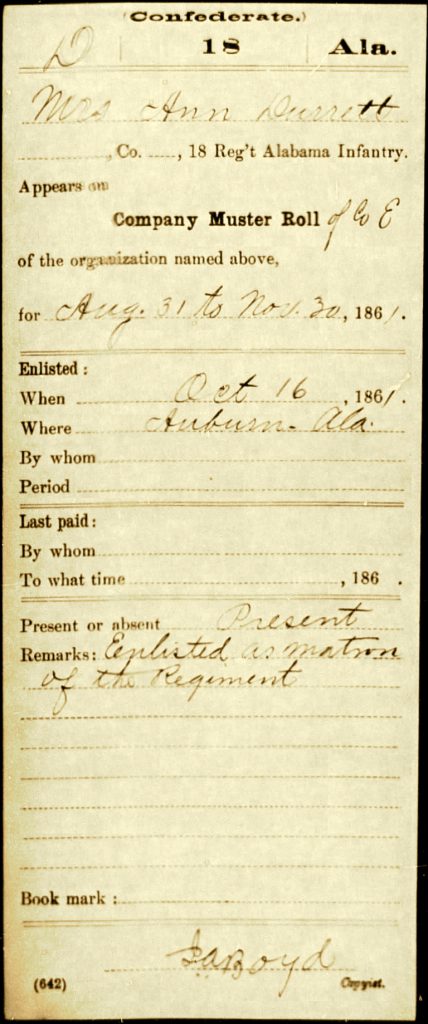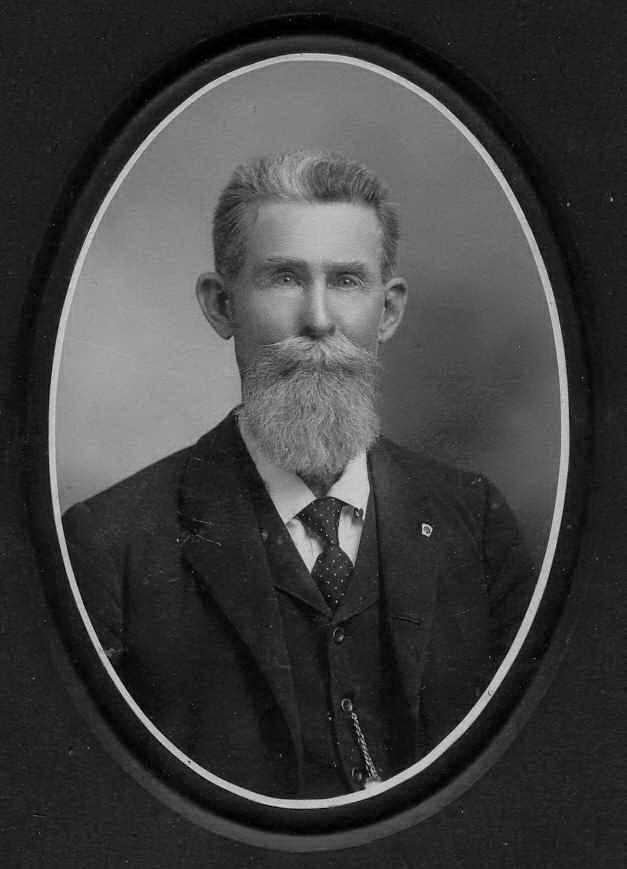Research Arsenal Spotlight 6: James A. Durrett of the 18th Alabama Infantry
James A. Durrett was born around 1840 to John Andrew Jackson Durrett and Anne (Beauchamp) Durrett. James A. Durrett, along with his brother Thomas Jefferson Durrett and cousin Henry Durrett, enlisted in Company E of the 18th Alabama Infantry in the fall of 1861. Even more amazingly, their mother, Anne Beauchamp Durrett also appears on the muster records of the 18th Alabama Infantry as the “matron” of the regiment. Her records indicated that she received pay through November 30, 1861.

While Anne (Beachamp) Durrett seems to have stopped serving with the regiment sometime in 1861 or 1862, her sons stayed on for the duration of the war and she is the recipient of some of James A. Durrett’s letters home. Our collection spans nine letters written from 1863 to 1865 as well as photos of some of the Durrett family.
James A. Durrett and the Battle of Missionary Ridge
The Battle of Missionary Ridge took place on November 25, 1863 and with it the Union army seized control of Tennessee and held Chattanooga which would soon become a major logistical hub for their armys. The Confederate forces under General Braxton Bragg were forced to withdraw and a large number were taken prisoner, including James A. Durrett’s brother, Thomas.
In a letter to his sister written on December 2, 1863, James A. Durrett detailed what he had learned about Thomas’s capture.
“I suppose you have heard the sad news of Tom’s capture before now. I know that a wise Providence has and will direct all things to be as they are, but I sometimes wish that I had been permitted to have shared his fate. I know that if alive, a long and tedious captivity and exile from home and all that is dear to him awaits him, but he can feel that he has done his duty, and that will sustain him in captivity — or death if need be. I will tell you all I have been able to learn about him.
When our Brigade went into battle it went into an ambush the Yankees had prepared and the first notice they gave of themselves was to pour a deadly fire into our Brigade from three directions. This threw us into confusion and a great many — seeing that they were flanked and nearly surrounded — started to run but being rallied by the officers, stopped and fought until the officers — also seeing the danger of being cut off — gave the command to retreat. Tom with eleven others of our company either not hearing or not wishing to obey such an order, stood their ground and while the rest made their escape, were surrounded. The rest is left to conjecture whether they continued to fight and were killed at their post (which I do not think probable), or, seeing they were surrounded and no chance of escape, surrendered.”
Although he was not directly involved in the battle, James A. Durrett had a close call of his own:
“I was not in the battle. I was detailed to hold the Colonel’s horse. Because I had no gun, my business does not require me to keep a gun, and as we were not expecting a battle even in the morning of the day it came off. I had no chance to get a gun, but I think I will be prepared for the next one. I came very near being captured — so near that I was obliged to throw away my knapsack and haversack and run about five miles. But I suppose I had better not tell that part of it as it is not military to throw away baggage on a retreat. I will close for tonight.”
Near Capture at Egypt Station
There is a gap in James A. Durrett’s letters lasting through much of 1864, though he is known to have been hospitalized at Jackson, Mississippi for much of the winter of 1864 and early 1865. On February 18, 1865, James A. Durrett wrote to a friend, Mrs. Marian Abigail (Fitch) Searcy, a former schoolteacher. He first detailed the much reduced state of his regiment saying:
“On returning to my regiment from the Hospital, I found it much decreased in number. In fact, but very few who went into Tennessee returned. Of my company, but two escaped capture — though strange to say, none were killed or even wounded — all captured [and] doomed to waste away their lives in Yankee prisons. Slowly and wearily the time will drag along with them, but then it is a soldier’s fortune and, as such, they will take it nor grumble at the hardship, but be thankful that life is spared to them.”
James A. Durrett then went on to recount his own close call with capture:
“I came very near being captured by a raiding party of Yankees after I left home the last time. I had got to Okolona, Mississippi, on my way to my regiment when the railroad was torn up thirteen miles above there by the raid. I joined a company and went back to Egypt Station, seven miles below Okolona. At daylight next morning, and while we were asleep, the enemy surrounded us. As soon as this was known, the company to which I belonged was ordered to get on the cars as an attempt was going to be made to run the train out and save it from capture. We ran out almost through the enemy’s lines, they firing at us all the way, and we returning it with interest. After making so bad an out in my first attempt to reach my regiment, I concluded to wait for a quieter time and remained in West Point, Mississippi, until my regiment passed on its way here.”
Death of James A. Durrett
A terse letter written on April 3, 1865, by James A. Durrett’s cousin, Henry, revealed James A. Durrett’s grim fate during the Battle of Spanish Fort:
“Dear Cousin,
It is with painful regret that I inform you that Jimmy was this evening mortally wounded, being shot directly through the brain. He was wounded about four o’clock this evening. While standing in the ditches, he imprudently raised his head to look over at the enemy which was firing at our line. He is now at the field hospital and will be sent to Mobile tonight. As he had written the letter enclosed with this [dateline 22 March 1865], I concluded to send it to you with a lock of his hair.
I am, dear cousin, yours with great sympathy, — Henry Durrett”
The letter written March 22 was a happy one from James A. Durrett, sharing the news that many of his brigade had been exchanged and he hoped that his brother Thomas, already a prisoner for two years, would be among them.
One April 7, 1865, Anne (Beauchamp) Durrett received a more detailed account of her son’s death:
“I very much regret to have to inform you that your son James is dead. He died about dark on Monday evening the 3rd of this month from a gun shot received that evening near Spanish Fort, about fifteen miles below Mobile. The ball penetrated his forehead just below the edge of his hair and came out near the top of his head. The blow seemed to produce insensibility and he never spoke afterward, but continued to sink until death. Henry Durrett, who accompanied him to the field hospital, was present at his death…”

James A. Durrett was buried in Mobile, Alabama. His brother, Thomas, survived the war and was finally exchanged on May 23, 1865. Thomas passed away in 1924 at the age of 82. To read the full collection, sign up for a Research Arsenal membership.
We’d like to extend a special thank you to William Griffing at Spared & Shared for transcribing and sharing these letters.
For more spotlights on our collection, check out our articles on Albert Henry Bancroft of the 85th New York Infantry and Colonel Clark Swett Edwards of the 5th Maine Infantry.

